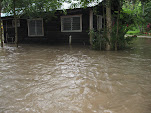Some friends and I were talking today about the human services profession and whether or not our interventions matter. We all agreed that they matter on the individual level, helping that one person with their crisis alleviates that one person's suffering. But what about global suffering? Or influencing the people that are driving it?
J thinks it's a brilliant strategy. Get all of us bleeding hearters together and promise we can MAKE A DIFFERENCE. And then we go and spend our entire lives bailing out the ocean with a thimble and wonder why we are frustrated. We work and work and work and everyone is still homeless. For every one person housed another two walk in the door. So we work harder and more people still walk in the door. And one day we pull our head out of our asses and wonder what has happened, why NO DIFFERENCE HAS BEEN MADE.
This isn't me feeling sorry for myself. I think this sort of work is important on a human level, but it does give The Policy Smucks an excuse. As long as they keep allocating funding to treat the problem then we never have to actually solve the problem.
I often wonder what it would really cost to provide affordable housing to 90% of the homeless people in our country and I wonder if it would indeed be cheaper than supporting the thousands of service agencies that provide an array of services needed to treat homelessness from shelter to short term housing to food to free clinics to detox facilities to counseling agencies to vocational centers. Sure, some of those places would still need to exist, a house isn't a magic pill that makes all other issues disappear. But there have been studies on the costs of homelessness and about the high costs/utilization of these support services that might not need to exist should people have more stability.
So then I wonder what is in it for them. What would be the incentive to enable rather than solve. There can't be much of a sense of accomplishment, at least not akin to the one they (note how I pretend to think for them) should feel should homelessness cease to exist. Or maybe they just don't care. So it begs the question: what does keeping people homeless do for our country? What benefits exist by choosing to allow this to continue? Is it simply economic, that providing adequate resources isn't financially viable? (but don't tell me we couldn't pony up because bringing all that freedom to Iraq could have solved a host of domestic crises if that 12 billion a month price tag is accurate). And what about all the money we throw at managing the crisis rather than solving it?
I just can't fathom it. So instead I go back to a common notion that we need to keep people sick and tired and scared in order to have some measure of control over them. And if we control them they will not revolt or vote or change the system. But I acknowledge that I lead so far to the left that I see things diagonally so I welcome your thoughts on the matter. Because if we can get to the root of it it might help us learn where to start.
skip to main |
skip to sidebar


Man, I see in Fight Club the strongest and smartest men who've ever lived. I see all this potential, and I see it squandered. God damn it, an entire generation pumping gas, waiting tables; slaves with white collars. Working jobs we hate so we can buy shit we don't need. Our Great Depression is our lives. We've been raised on television to believe that one day we'd all be millionaires. But we won't. And we're slowly learning that fact. And we're very, very pissed off.
twhat?
Did you know that you can earn a
masters degree in social work and never have to leave home?
gimme shelter (advertise on one plus two)
Wrinkle Cream such as Dermapril reviewed and evaluated
When I'm with you baby, I go out of my head
- 24/7
- Blog Antagonist
- Can we kick the bar here
- Chicken and Cheese
- Collecting Tokens
- Confessional Highway
- Crazymumma
- Creative Mother Thinking
- Crib Chronicles
- Defiant Muse
- Denguy
- Faking it
- Flutter
- Her Bad Mother
- Her Grace
- I am doing the best I can
- I Obsess
- Jenn and her queens
- Julie the Ravin' Maven
- Lawyer Mama
- Lucia has something to say
- Madame Chick
- Magpie Musing
- Mama Tulip
- Meno's Blog
- Metro Mama
- MOMocrats
- Oh the Joys
- Painted Maypole
- Pundit Mom
- Razor-blade of life
- Redneck Mommy
- Ruthless in the Suburbs
- Shavings off my mind
- She's Oh So Sage
- Shilly! Shally! Dilly! Dally!
- Slouching Mom
- Sticking to the Point
- Sweet Juniper
- Tabba the Incredible
- Thailand Gal
- The Bloggess
- The Journey
- The Kids are Alright
- Truth Cycles
- Under Mad's Hat
- Urban Urchin
- Velveteen mind
- Wayfarer Scientista
- Where's My Cape?
- Woman on the Verge
Subscribe
About Me

- Girlplustwo
- The story of a free-spirited woman who after much living had a baby and until recently was in charge of a non profit that helped to get people off the streets. But I've left it all behind to move to the jungle and figure out a way to live more sustainably while seeing more of the world. It took us five years and we still aren't quite sure what we are doing but we are doing it anyways.
welcome to our jungle

Be cool.
All content here belongs to me unless otherwise noted.



































